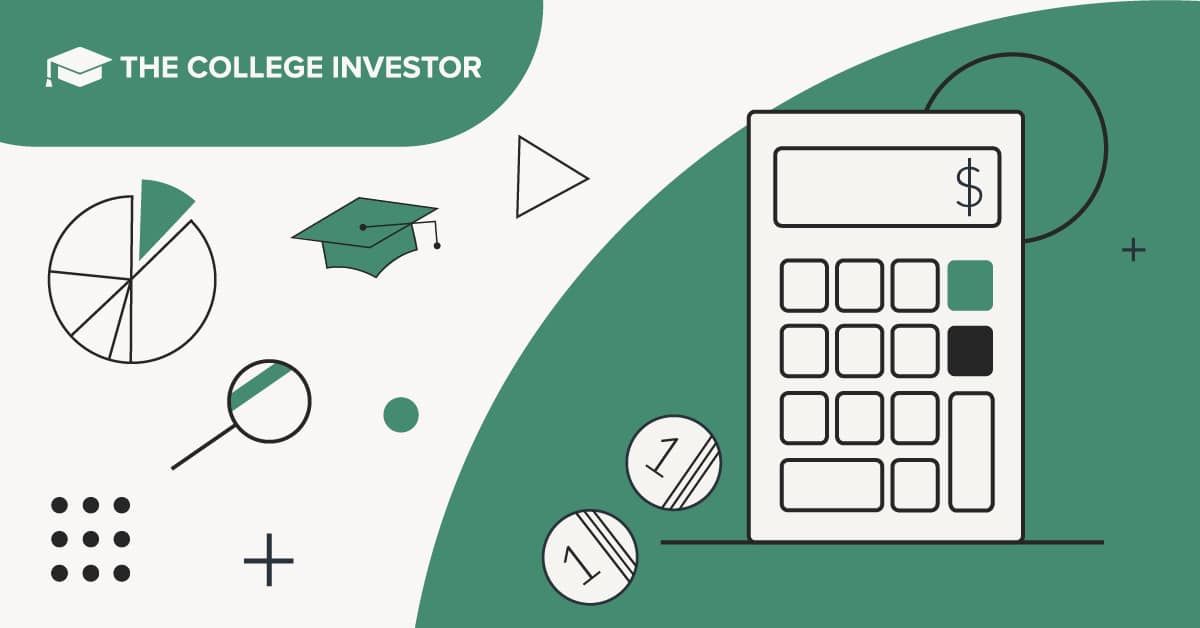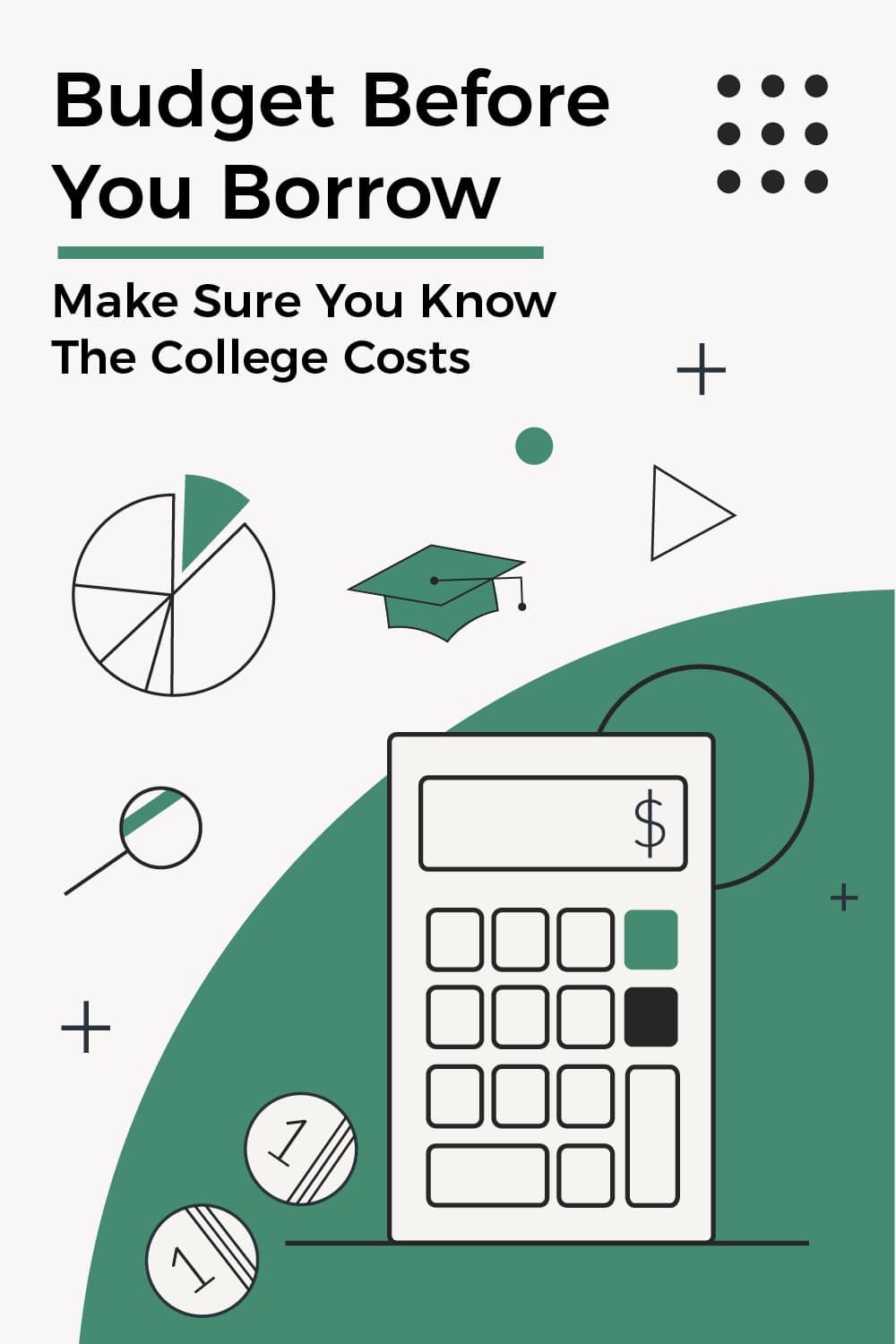
There are two types of budgets that students should consider before borrowing money to pay for college. One budget is used to determine how much you’ll need to borrow to pay for college.
The other considers how much student loan debt you can afford to repay after you graduate. Each type of budget will reduce the amount you may want to borrow.
A key goal of budgeting is to borrow as little as possible. Borrowing increases your costs. Student loans must be repaid, usually with interest. Borrowing too much money will make it harder to repay your debts.
Budgeting For College Costs
To minimize student loan debt, borrow only what you need, not as much as you can. Don’t treat loan limits as targets.
Start by figuring out how much you’ll need to borrow. Subtract financial aid, such as grants and scholarships, from total college costs. Some of the remaining costs can be covered with contributions from savings and income. What’s left is how much you’ll need to borrow to pay for college.
College costs fall into two groups, mandatory and discretionary. Mandatory costs include tuition and required fees, as well as taxes on scholarships and student employment. Discretionary expenses include room and board, transportation, books, supplies and equipment, as well as walking around money (e.g., eating out and entertainment). Discretionary expenses often include consumables that don’t have as lasting an impact as the mandatory expenses.
There is some flexibility with discretionary expenses. Try to cut the discretionary expenses as much as possible. Live like a student while you’re in school, so you don’t have to live like a student after you graduate.
Every dollar you borrow will cost about two dollars by the time you repay the debt. So, ask yourself if you would still spend the money if it cost twice as much, because that’s really how much it will cost you.
Mandatory expenses are much less flexible. Sometimes, you’ll have no choice but to cut mandatory expenses, such as tuition. You don’t need to go to the most expensive college in your field of study. An in-state public college may give you just as good a quality education (sometimes even better) as at a high-priced private college, but at about a third of the cost. Although you may qualify for less financial aid at a lower-cost college, your student loan debt may also be lower.
Be careful about cutting some expenses. Statistically, students who enroll part-time, enroll at a community college, work a full-time job or live off-campus are less likely to graduate with a Bachelor’s degree. However, knowing the statistics can help you avoid becoming one.
Using A Budget
Preparing a budget can help reduce spending. When you know what you’ll owe, you are less likely to spend as much. Similarly, increasing awareness of spending is the first step in exercising restraint. Understanding college costs can also encourage you to apply for more scholarships and grants, since free money is cheaper than borrowed money.
Track your spending in each budget category by getting receipts for every expense. Record the expenses in a spreadsheet or personal finance software like Mint.com or Quicken. Calculate totals for each category at the end of the month and compare them with your budget. Just knowing that you spent too much money in one category will help you hesitate to spend too much in that category in the future.
There are other psychological tricks that can help you limit spending. “Paper or plastic” is not just a question asked at grocery stores. It also concerns whether you use cash or credit to spend money. Paying with plastic feels the same, whether you are spending $5 or $500. Paying with cash, on the other hand, makes it feel like you’re spending real money.
This is why some students try a cash-in-envelopes approach, where each discretionary budget category has its own envelope. When the money in that envelope is gone, it cannot be replenished until the start of the next month. The spending must necessarily end.
The one time you should procrastinate is when it comes to spending money. Try to build in delays when spending money, especially on big ticket items. Wait a few days before buying something to see if you really need it. The delay helps you resist the immediate impulse to spend money by distancing you in time and space from the object of your desire. Do you really need to spend the money? If you do need it, do you need to buy it now? Can you save money by buying it used?
Related: Budgeting For Your Personality
Budgeting For Repayment
In addition to budgeting based on college costs, you should also consider your ability to repay your student loans after you graduate. Don’t borrow more than you can afford to repay.
If you borrow too much money, you may get into financial trouble. You can get trapped in a cycle of debt, never being able to pay off your student loans, forcing you to borrow more for other expenses. Defaulting on your student loans can ruin your credit, making it difficult to get a credit card, auto loan or mortgage. When you do qualify for a loan, your interest rate will be higher. Defaulting on a student loan can also affect your ability to get a job or rent an apartment.
There is a simple rule of thumb for affordable student loan debt. Aim to graduate with less total student loan debt than your annual starting salary. If your total debt is less than annual income, you should be able to pay off your student loans in ten years or less.
This rule of thumb is the equivalent of having monthly student loan payments on a 10-year repayment term that are less than 10% of gross monthly income. Your monthly student loan payment will be about 1% of the loan balance when the loans entered repayment.
Estimate your student loan debt at graduation by multiplying your first-year student loan debt by four and add 20% to cover the impact of loan fees and the interest that accrues during the in-school and grace periods.
You can estimate your starting salary based on your academic major by using various websites, such as Payscale.com’s College Salary Report, Salary.com, U.S. Bureau of Labor Statistics (BLS), the U.S. Census Bureau’s Post-Secondary Employment Outcomes Explorer and the U.S. Department of Education’s College Scorecard.
If total student loan debt will exceed your annual income, you’ll struggle to repay your student loans in ten years. Try to find a way to borrow less. Otherwise, you’ll need an alternate repayment plan, such as extended repayment or income-driven repayment, which reduces the monthly student loan payments by increasing the repayment term. But, increasing the repayment term will also increase the cost of your loans.
Even if your student loan debt is in sync with your income, try to pay off your student loans as quickly as possible.
- Pay more to pay less. Choosing the repayment plan with the highest payment you can afford will save you money on interest and pay off your student loans quicker.
- Pay extra to pay less. Make extra payments on the loan with the highest interest rate, which might not be your student loans, but rather your credit cards. This will reduce the weighted average interest rate on your debts and save you the most money.
You can also save by signing up for AutoPay or Auto-Debit, where your student loan payments are automatically transferred from your bank account to the lender. Not only are you less likely to be late with a payment, but you may save money. Most lenders will provide a small discount, such as a 0.25% or 0.50% interest rate reduction, as an incentive.
When you file your federal income tax returns, claim the student loan interest deduction. This is an above-the-line exclusion from income for up to $2,500 in interest paid on federal and private student loans. You can claim it even if you don’t itemize deductions.
If you pay all your bills on time, your credit scores will improve enough within a few years of graduation for you to qualify for a lower interest rate on a private refinance of your private student loans.

Mark Kantrowitz is an expert on student financial aid, scholarships, 529 plans, and student loans. He has been quoted in more than 10,000 newspaper and magazine articles about college admissions and financial aid. Mark has written for the New York Times, Wall Street Journal, Washington Post, Reuters, USA Today, MarketWatch, Money Magazine, Forbes, Newsweek, and Time. You can find his work on Student Aid Policy here.
Mark is the author of five bestselling books about scholarships and financial aid and holds seven patents. Mark serves on the editorial board of the Journal of Student Financial Aid, the editorial advisory board of Bottom Line/Personal, and is a member of the board of trustees of the Center for Excellence in Education. He previously served as a member of the board of directors of the National Scholarship Providers Association. Mark has two Bachelor’s degrees in mathematics and philosophy from the Massachusetts Institute of Technology (MIT) and a Master’s degree in computer science from Carnegie Mellon University (CMU).
Editor: Robert Farrington Reviewed by: Chris Muller
